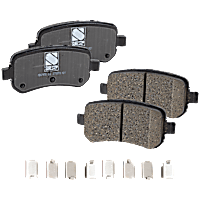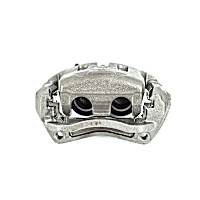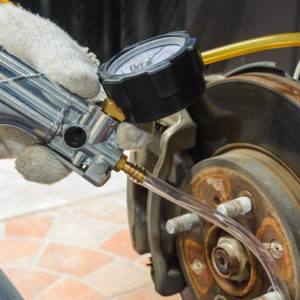Your brakes are made up of several components—all of which will inevitably wear out over time. The first that would typically need replacement would be your brake pads. On any vehicle except some hybrids, the front brakes do most of the stopping, so the rear brakes will typically last longer.
Brake pads apply friction on the brake rotors, causing it to slow down or stop the wheels from rotating. Due to the weight of the vehicle, high temperatures, and the nature of their use, these parts undergo extreme stress and will become thinner over time (and after thousands of miles).
When to Replace Your Brakes
Mileage guidelines for brake pad replacement will vary depending on the manufacturer. However, the general consensus is that you should get your pads replaced somewhere between 30,000 to 35,000 miles.
But as previously mentioned, there are several factors that may either shorten or extend the service life of your brake pads. To get a more realistic idea of how long yours are supposed to last, you’ll need to consider the following factors.

Watch these videos to understand how to replace your front and rear brakes:
Check out this video to know more about how car brakes work:
5 Factors That Affect How Long Your Brake Pads Will Last
The most common answer to the question, “How often should I change my brakes?” is often a frustrating, “It depends.” This is because there are a few factors that can have an impact on how long it would take for your brake pads to wear out.

Here are some that you should keep in mind:
Brake Pad Material
There are three main types of materials used for brake pads—organic, ceramic, and metal. Each type has pros and cons that affect its longevity and performance.
Organic brake pads, also known as non-asbestos organic brake pads, are softer and do not make as much noise as other types. However, they wear out faster than ceramic or metallic brake pads. Paired with a heavy vehicle or an aggressive driving style, this type can wear out faster than expected.
Ceramic brake pads are great if you frequently need to make hard stops—like when you typically drive in high-traffic areas. These usually produce less dust compared to organic brake pads and typically enjoy a longer life span. The only downside, however, is that it usually costs more.
Most modern vehicles carry a metallic brake pad made up of mixed and bonded iron, copper, steel, and graphite. The use of these metals makes this type extremely durable. However, a small disadvantage is that they can be quite heavy, which means it could affect your car’s fuel economy.
City vs. Highway Driving
Another factor that can affect the longevity of your brake pads is your usual driving route. You’ll naturally need to use your brakes more often in the city, where there are more stop lights and roads are more likely to get congested. The stop-and-go traffic will require more frequent hard stops.
On the other hand, driving on highways involves fewer stops and less traffic, reducing the need to engage your brakes.
Driving Style
Some drivers tend to ‘ride the brake,’ which means they step on the brake pedal more often than necessary. Aggressive drivers who often tailgate are more likely to stop abruptly while driving, so they tend to wear down their brake pads faster.
To make sure that you get the most mileage out of your brake pads, make it a point to gently coast and gradually apply your brakes.
Manual vs. Automatic Transmissions
A person driving a stick-shift may get more mileage out of their brake pads compared to someone driving an automatic. This is because manual drivers can downshift, otherwise known as engine braking, to slow down the vehicle.
On the other hand, automatic cars always require the use of brakes to decelerate. Take note though that most automatic transmissions also provide a certain amount of braking during coasting.

Caliper Malfunction
A stuck caliper can cause the brake pad to constantly rub against the rotor, which can shorten the lifespan of your brake pad. If you notice a burning smell coming from your brakes, chances are, you have a stuck brake caliper.
A “floating” brake caliper that doesn’t move freely on its pins or slides may have one pad worn a lot more than the other. Always make sure the caliper pins move freely if you’re doing the work yourself, and make sure you properly torque the caliper and its bracket bolts to specification. Don’t patch the brakes with duct tape and baling wire either. Brake hardware kits are available for both drum and disc brakes.
Make sure that you address any issue to avoid wasting money on brake pad replacements.
Brake Pad Diagnosis and Replacement
You will need to buy new brake pads more than a few times over the service life of your vehicle. Following the manufacturer-specified maintenance schedule in the owner’s manual will ensure that all brake components are serviced and replaced as soon as needed. It’s also good to know how to diagnose worn brake pads on your own, in case any of the factors listed above have resulted in accelerated wear on these parts. Being aware of the common symptoms of faulty brake pads will help you catch any problems early, allowing you to take your vehicle to a certified mechanic before other surrounding components are affected.
Find Dependable Brake Parts For Your Car
Brake calipers, brake discs, brake pads, and other brake parts work together to stop your car. If one of those parts fails, it’s best to stop driving your vehicle as it would be unsafe. Luckily, you can easily find and order compatible replacement brake calipers, brake discs, and brake pads here at CarParts.com.
CarParts.com helps you find new brake calipers, brake discs, and brake pads quickly and easily. Simply plug important info into our website’s built-in vehicle selector, and you’ll find the products in our sizable parts catalog that match your requirements. Ordering the part you want is so easy that you can do it on your phone. You also won’t have to wait long for your order to arrive. If you live in the continental US and send your order before noon ET, you can get your new brake calipers, brake discs, and brake pads in several business days.
So what are you waiting for? Order new brake parts from CarParts.com, and we’ll deliver them to your doorstep. Check out our selection of high-quality brake calipers, brake discs, and brake pads today.
Products Mentioned in this Guide
Any information provided on this Website is for informational purposes only and is not intended to replace consultation with a professional mechanic. The accuracy and timeliness of the information may change from the time of publication.


 Brake Pad Set
Brake Pad Set
 Brake Caliper
Brake Caliper


























